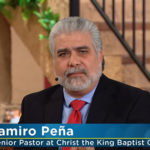Rumor has it that Al Pacino turned down the role of Han Solo in “Star Wars.” Pacino is a great actor but casting him in “Star Wars” would have changed the entire tenor of the movie. Seems like the right person picked up the right script at just the right time. Pacino declined the role and Harrison Ford made Han Solo legendary.
The wrong person in the wrong role ruins a project. The right person in the right role at the right time is transformative.
For too long now, pastors and politicians have been picking up the wrong scripts. One trend remains consistent over the past decade: pastors continue to sound more like politicians, while politicians begin to sound more and more like pastors. As they meet in the middle, we miss the best of what each has to offer.
Theologians and politicians
Politicians love to play the role of pastor. Pastors relish the spotlight of the politician. When they switch roles, they forsake the gifts each can bring to the public sphere. Pastors can offer guidance in ethical decision-making and morals while politicians negotiate the difficult terrain of legislative consensus and compromise. With the right people in the right roles, there’s a better opportunity for the flourishing of all.
In 1954, George MacLeod, founder of the Iona Community in Scotland, voiced a similar concern about theologians and politicians. “The theologian is so frightened of what his clear principles imply that he accepts the practice of the politicians. The politician is so frightened of where his practice has led that, secretly he is aghast that the church has no firm principle to offer, such as might begin to save.”
Pastors and theologians have become more concerned with baptizing their preferred politicians than upholding the values and virtues our faith demands.
Davids and Nathans
The Old Testament devotes many pages to the rule of King David over ancient Israel. David tends to overshadow everyone else in those stories. But, in the David stories, the prophet Nathan plays a key role. He is the one who stands up to David and calls him out for his affair with Bathsheba and for the death of Uriah the Hittite.
We pastors aspire to be the next David when we should be aspiring to be the Nathan we need now. The lure to power is captivating. Who wouldn’t want to be David? But, David couldn’t have been the king he was without the prophet Nathan.
Pastors have a distinct vocation. Pastors can bring healing to our political discourse by crafting cultures within churches where republicans, democrats and independents work together for the kingdom of God. Through our shared righteousness, and even our shared brokenness, we can offer renewed conviction for a more just and moral society.
Sign up for our weekly edition and get all our headlines in your inbox on Thursdays
The gospel has political implications. The justice the gospel demands must be sought after in organized ways. But, that effort requires Davids and Nathans.
The great risk
When pastors go on cable news as pundits pawning a political candidate, it’s obvious that they are not so much interested in a policy as they are in protecting a golfing partner. When leaders of Christian institutions create limits to the ethic of Jesus by implying that the ways of Jesus are no way to run a country, then that leader is creating cover for the immorality of politicians.
Seeing pastors and Christian leaders act this way is awkward and confusing—almost as awkward and confusing as picturing Pacino flying the Millennium Falcon.
Preachers sometimes hear they need to stay in their lane, which means, “Don’t preach politics unless they are my politics.” The greater risk is not staying in our lane; it is learning the wrong role.
Pastors are not docents of the status quo. We are midwives of God’s kingdom.
Garrett Vickrey is pastor of Woodland Baptist Church in San Antonio.














We seek to connect God’s story and God’s people around the world. To learn more about God’s story, click here.
Send comments and feedback to Eric Black, our editor. For comments to be published, please specify “letter to the editor.” Maximum length for publication is 300 words.